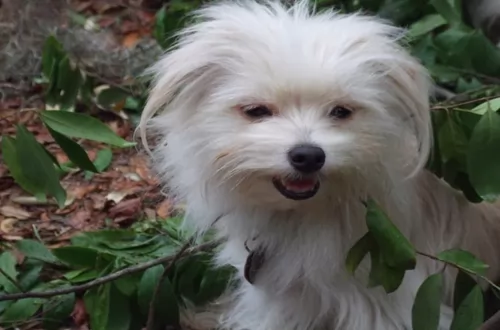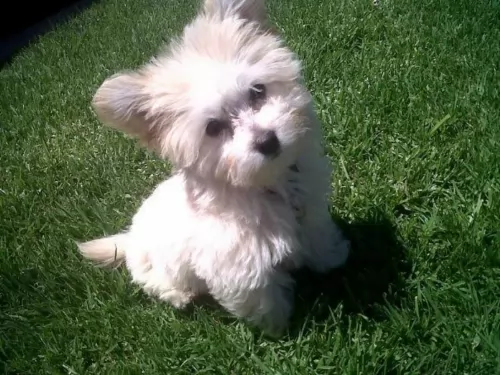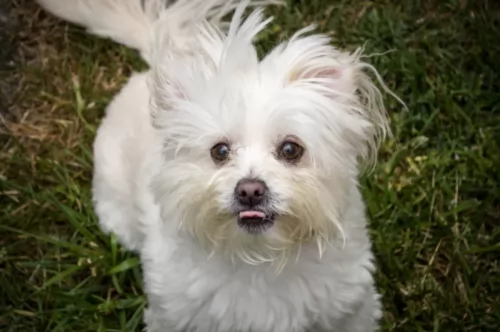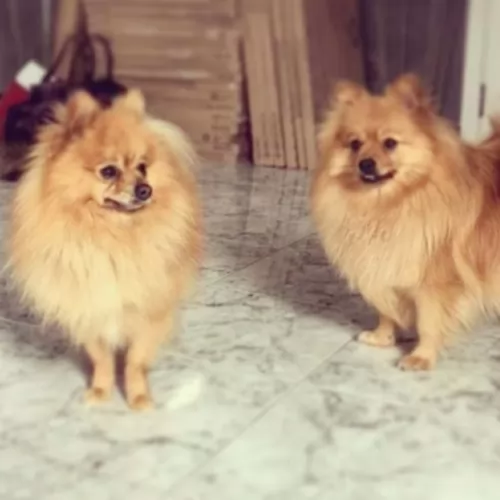 Petzlover
PetzloverBoth Gran Mastin de Borinquen and Malti-Pom are originated from United States. Gran Mastin de Borinquen may grow 43 cm / 17 inches higher than Malti-Pom. Gran Mastin de Borinquen may weigh 63 kg / 139 pounds more than Malti-Pom. Gran Mastin de Borinquen may live 3 years less than Malti-Pom. Gran Mastin de Borinquen may have more litter size than Malti-Pom. Gran Mastin de Borinquen requires Low Maintenance. But Malti-Pom requires Moderate Maintenance
The Gran Mastín de Borinquen is also referred to as the Puerto Rican Mastiff or the Mastín Borincano and is actually native to Puerto Rico.
The dog seems to have originated long ago already during the 16th century. Its a dog that descends from a number of dogs, and the dog from these crosses became a huge, ferocious dog.
For centuries the Gran Mastin de Borinquen was used to protect the estates of the Spanish nobility. Today the breed is considered rare and it isn't recognized by any major kennel club as a standardized breed.
 The sweet little Malti Pom is a dog which comes from crossing two purebreds – the Maltese Poodle and the Pomeranian.
The sweet little Malti Pom is a dog which comes from crossing two purebreds – the Maltese Poodle and the Pomeranian.
The appearance of this dog will vary according to how much of each breed is in the dog. The exact origins of the Maltipom breed are unknown but many new dog breeds have originated in the United States.
The Maltipom is also not recognized by the AKC because it’s a hybrid of two pure breeds and not looked upon as a new breed. It is however recognized by the American Canine Hybrid Club.
The Gran Mastin de Borinquen is a large dog. He stands roughly between 56 and 71cm and weighs in at between 41 and 68kg.
He is well muscled with a large head and short floppy ears but until recently the ears have always been cropped. The nose is black, the eyes dark brown and small and he has an alert, intelligent look to him.
These days the tail is kept long and it is held low. The coat is short in length and harsh with the colour being fawn, black, cream or brindle. You'll also find some small inclusions of white on the coat.
Loyal and protective, the Gran Mastin de Borinquen forms a strong bond with his master, becoming aggressive with any stranger who comes too close to his owner.Its a dog that has been taught to be aggressive so he isn't the best pet to choose if you have children in the home. He isn't the best dog either for first time dog owners, particularly if the person isn't a strong, firm person around him, showing who is boss.
However there are people who have had their pet trained and socialized and who claim he makes a wonderful family pet. The way a dog is brought up can play a large role in the way he turns out.
Train and socialize your Gran Mastin de Borinquen because he is inclined to be strong-willed and for a large, aggressive type of dog, you want him to be obeying you.
 The Malti-Pom is a crossbreed, so pinpointing his exact size can be somewhat difficult, but you can expect him to be in the region of 20 to 28cm and weigh in at about 2 to 5kg.
The Malti-Pom is a crossbreed, so pinpointing his exact size can be somewhat difficult, but you can expect him to be in the region of 20 to 28cm and weigh in at about 2 to 5kg.
Both the Maltese and the Pomeranian are both toy dogs, so the Malti-Pom is almost sure to be a small dog. His appearance will also vary depending on which side he inherits most of his looks from. Generally though, he has a long coat of straight, soft hair.
He is a low shedder and with the poodle side of him he is looked upon as being hypoallergenic. The coat can be cream, apricot, white or black as well as a combination of these colors.
This is such a friendly, amicable little dog. He is good with children and can get on well with other pets in the home.Children should be taught to be gentle with any dog, but particularly a small one like this.
The Malti-pom is extremely loyal and affectionate with its family members, but ends to form a special bond with one member of its family.
These little dogs are generally reserved with strangers. They are well-behaved, sociable and can mix well with children and pets in the home. These toy dogs are clever so you won't battle with him with training and socialization.
Although the Maltipom looks cute and is an amicable dog, he can bark quite aggressively when he encounters strangers who he believes might harm his family. He makes a good watchdog.
Noble, courageous and loyal, a trained, socialized Gran Mastin de Borinquen who has learned simple commands such as sit, down, come, stay, lie-down and heel will be an absolute pleasure to have around and be a well behaved, obedient companion for you.
Your Gran Masin is a dignified, loving animal, but because of his size and his origin, bred to be aggressive, he isn’t looked upon as the first choice when you’ve got small children in the home. With the right owner – fair, firm and loving - he makes a splendid pet.
 Because your Malti-Pom comes from two different dog breeds, you can’t really say what kind of personality traits he will inherit.
Because your Malti-Pom comes from two different dog breeds, you can’t really say what kind of personality traits he will inherit.
Both the Maltese and the Pom are small lap-type dogs who are essentially companion dogs. You can be sure your Malti-pom is going to be cute, social, energetic, vibrant and loving. They are able to adapt well to life in the city or the countryside and a nice walk every day will go down well in terms of exercise. It give your pet a chance to get outdoors and to sniff new scents.
With the Maltese and the Pom being the two parents of this dog breed, you can be sure that you’re going to have a splendid little pet who is guaranteed to bring lots of smiles into your home from his jovial, entertaining ways
Your Gran Mastin de Borinquen can get to 12 years of age with good care. Mastiff-type dogs like this can be prone to eye problems as well as having to tackle joint problems such as hip dysplasia.
Other issues that can appear in this breed, but are unlikely be cancer, bloat, hypothyroidism and von Willebrand’s Disease which is a bleeding disorder.
Remember to do daily inspections of your Gran Mastin de Borinquen for fleas and ticks, particularly during the Summer month. Toxins introduced into the body by a tick bite for instance can make your pet seriously ill so that veterinary intervention is required.
 Fortunately, the Maltipom is considered to be a healthy dog, and he can live with you for a good number of years with good care. The Maltipom could develop heart issues.
Fortunately, the Maltipom is considered to be a healthy dog, and he can live with you for a good number of years with good care. The Maltipom could develop heart issues.
Heart disease is fairly common in dogs and some symptoms will include a cough, loss of appetite and he might tire easily. One of the common types of heart disease is degenerative valvular disease, where the heart valves fail.
It is believed that degenerative valve disease is a heart disease which accounts for about 75% of all heart disease in dogs. Diagnosing heart disease requires a number of different testing methods.
The Gran Mastin de Borinquen, with his short coat, is a relatively low maintenance breed. Brush him at least twice a week to keep the coat free of loose hairs. Other grooming requirements are keeping his ears clean and dry. You can ask about alcohol wipes at your local pet shop to use in his ears. Check the nails too and remember to brush his teeth a couple of times a week to avoid dental decay.
You won't find the Gran Mastin de Borinquen being a particularly high energy dog but he also isn't a couch potato. If you enjoy a walk every day for your own good health, include him in these walks and give him a game of ball every now and again.
This Mastiff -type dog is large, and they tend to be fairly lazy, not using up great deals of energy. Young dogs however use up more energy and will require a diet with good quality protein.
Dogs that have been spayed or neutered as well as senior dogs will require less calories. If you buy commercially manufactured food, check the labels carefully and buy high quality food for a large breed.
Don't just feed your Gran Mastin kibble everyday but alternate it sometimes, mixing in some raw meat into his kibble or mixing in some cooked chicken, rice and vegetables.
 The Maltipom is a tiny dog, and that’s an advantage actually as he isn’t going to cost you too much to feed. Half a cup of food in he morning and another in the evening will keep him satisfied.
The Maltipom is a tiny dog, and that’s an advantage actually as he isn’t going to cost you too much to feed. Half a cup of food in he morning and another in the evening will keep him satisfied.
If you give him commercially manufactured food, choose a high quality one specially made for small dogs. You can chop up cooked chicken, brown rice or pasta and some cooked vegetables finely and add this to his dry kibble from time to time as a tasty treat.
A tiny little bit of raw meat once in a while will also keep him healthy. Keep things simple – don’t try all sorts of weird foods with him as he can battle with digestive problems.
Groom your pet. Brush him at least twice a week. Check his eyes and ears for infection and remember to brush his teeth at least 2 or 3 times a week with special canine toothbrush and toothpaste.
Make sure he is exercised. He'll love a walk each day.